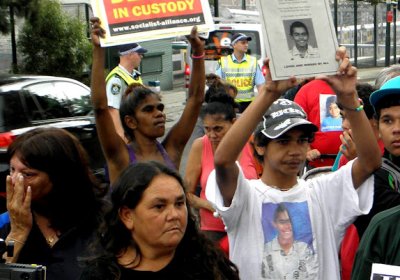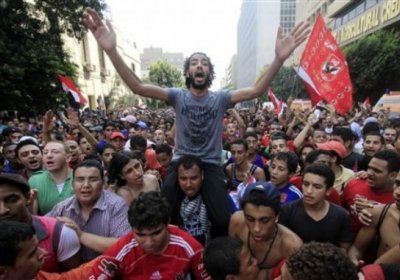There is little doubt that the Catholic Church is in crisis as a result of deep internal problems.
Alongside revelations that child abuse has been widespread within the Church, and that high ranking Church figures were involved in covering up these crimes, it has also been revealed that the Institute for Religious Work (IOR), better known as the “Vatican Bank”, was used for money laundering.
Raul Bassi
On February 14, 2004, as a consequence of a police pursuit, a Redfern police car driven by Constable Michael Hollingsworth rammed TJ Hickey’s bicycle. As a result, he was impaled on a spiked metal fence. The police did not follow proper medical practice and he died in hospital the next day.
This year will be the 10-year anniversary of his death. The Hickey family, with the support of the Indigenous Social Justice Association, will be rallying at the fence line on the corner of George and Phillip streets in Waterloo to mark the occasion.
Recent mid-term elections in Argentina revealed three key tendencies: a continued decline in support for President Cristina Fernandez de Kirchner and her Peronist-allied Front for Victory (FPV), the reemergence of new forces to its right, and what many have dubbed a “historic” vote for the Trotskyist left.
At stake in the October 27 national elections were half of the seats in the Chamber of Deputies and one third of the Senate, along with several elections for state parliaments and local councils.
For nine long years Gail Hickey and her family have indefatigably campaigned for justice over the death of their son, TJ Hickey, an Aboriginal man who was 17 years old. He died as a consequence of a pursuit by Redfern police that ended with his death the following day.
For nine long years Gail, the family and their supporters have been telling and re-telling the history. His bike was rammed by a police car, he was thrown in the air with great force, and landed on a spiked fence line with great force.
More than a year after the start of the “Arab Spring”, it is possible to draw up a provisional balance sheet.
Since January last year, popular rebellions have deposed a number of hated dictators across the region. It began with popular rebellions in Egypt and Tunisia, which spread to Yemen and Bahrain and through to the conflicts in Libya and Syria.
All of these rebellions, to varying degrees, reflected the emergence of powerful mass movements causing concern for imperialism and its regional allies — principally Israel, Saudi Arabia and Qatar.
On February 14, hundreds of Aboriginal people, many young ones, and non-Aboriginal people gathered at the fence where 17-year-old TJ Hickey was fatally wounded in Waterloo in February 2004. A police vehicle driven by a Redfern officer rammed TJ’s bike.
He was impaled on the fence and died in hospital the next day. There has been a corrupt coronial inquest, and a cover-up by the NSW government and Redfern police, and continuous protests. But eight years later there is still no justice for the young Aboriginal man and his family.
Despite the crushing victory of incumbent Cristina Fernandez de Kirchner in the October 23 Argentine presidential elections, the campaign and results also demonstrated that an important social and political left alternative continues to exist.
The unpredictable consequences of the global economic crisis and the reaction by Cristina’s mixed social base to future policy decisions may prove important challenges to her new government.
On September 30, 2001, in the midst of one of the worst economic crises in Argentine history, the owners of the Zanon ceramic factory announced plans to switch off the furnaces.
In response, union delegates occupied the plant in the southern province of Neuquen. The next day, workers arrived to join the occupation ― frustrating plans to sell off the machinery.
After the overthrow of Egyptian dictator Hosni Mubarak in February, a new chapter in Egyptian history is being written and its authors are the people themselves.
In June, four Australian set sail as part of the second Freedom Flotilla to Gaza with the aim of highlighting the suffering of its people at the hands of Israel’s illegal blockade.
The flotilla, involving a dozen boats with hundreds of activists from more than 50 countries, aims to deliver humanitarian aid to the besieged Palestinian territory.
The convoy coincides with the deep process of revolt occurring across the Arab world — against regimes that often collaborate with Israel.
“What changed in Palestine between December and April that made you change your mind?” yelled someone in the crowd, as the April 19 Marrickville Council meeting voted to overturn its previously stated support for the Boycott, Divestment and Sanctions (BDS) campaign against apartheid Israel.
Despite many others asking similar questions, none of the councillors that had voted in favour for the December 14 motion answered this simple question.
Twenty-three-year-old Mariano Ferreira, a Workers Party (PO) activist, was shot dead in Buenos Aires on October 8 when a mob violently attacked protesting railway workers.
The protesters, all of them labour hire workers, were demanding their reinstatement after being sacked.
The attack was similar those against other workers in comparable circumstances who have demanded rights denied by the bosses. Often the bosses’ have acted with local union support.
- Previous page
- Page 2
- Next page











